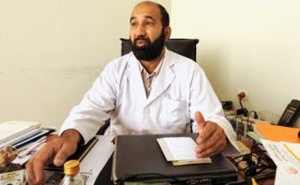Mohammed Hashim Wahaaj, a large Afghan doctor with a bushy beard, thought he was going to die.
"Bring a sword to cut off his head," he recalls one of his abductors as saying.

"I am a doctor," he said. "I should carry a pen or a stethoscope, but now I am carrying a pistol, I have guards... I feel I am a prisoner."
"They made me lie down in a position when you are cutting the head of a cow or lamb. I thought: in a few minutes, they will cut off my head," the 44-year-old doctor told AFP.
"They called my family and said, 'Ok, you cannot arrange the money. You will get the dead body of your brother.'"
The gang, which shot Wahaaj in the arm when they snatched him from his car in Kabul, also made his family listen to his cries over the telephone when they beat him with sticks and cables.
During more than 20 days of torture they came down from their original ransom of five million dollars and Wahaaj -- the wealthy owner of one of Afghanistan's best diagnostic centres -- was finally freed, for a sum he will not disclose.
He says his abductors were not from the extremist Taliban insurgency, who have kidnapped and killed scores of people they accuse of working for the government or its international allies.
These were just criminals profiting from a climate of lawlessness and impunity in which government officials at the most senior levels are getting away with crime and corruption, the softly spoken doctor said.
Naqibullah, a businessman, says his kidnappers had claimed links with the Taliban. But really, they were "just thieves," the 42-year-old told AFP.
He was captured heading back to Kabul from one of the provinces and kept in chains, blindfolded, beaten and threatened with death for almost two weeks, he said.
"Lots of money was taken by them as ransom," he told AFP, refusing to say how much.
It is an increasingly precarious situation for Afghans, who had hoped the ouster of the Taliban regime seven years ago would herald peace and security for a country destroyed by decades of war and extremism.
Those perceived as influential and wealthy -- and their children -- are most often preyed upon, especially in the main business hubs of Kabul and the western city of Herat, and on major highways.
The interior ministry in Kabul was unable, after several requests, to tell AFP how many people have been kidnapped nationwide. But stories in the media and on the grapevine suggest there are several every month in Kabul alone.
In Herat province, there were 22 cases in the past six months, says criminal investigation police chief for the area, Ali Khan Husseinzada.
They included the abductions of two Iranian businessmen freed last week after 40 days for an undisclosed ransom.
"Most of the victims are either business people, rich people or their sons or relatives," Husseinzada said.
The threat is also felt by the less wealthy who may nevertheless have the trappings of money such as a new home, albeit built on loans, or a job with an international company.
"I am afraid for my cousins because they are very rich. No one with cash is safe here," says Ahmad Khan, a 35-year-old Kabuli.
It is this fear that makes his cousins, who run a nail-making factory and also import car parts, use their shabby car to get to work and leave the new one at home, he says, to avoid drawing attention to themselves.
Other people don't let their children play outside or go to school alone; many surround themselves with bodyguards; professionals carry guns; some have fled with their families to Pakistan, Dubai and India.
Authorities say they are dealing with the problem. In about 75 percent of cases, kidnappers are being arrested, says interior ministry spokesman Zemarai Bashary.
The intelligence department regularly announces it has arrested kidnappers, sometimes parading them for the media. It freed 14 captured Afghans in the past few months and arrested 43 suspected kidnappers, it said.
But Afghans believe it is the authorities who are a large part of the problem, with accounts from survivors that their abductors were in police uniform or linked with senior officials.
"There is no justice in Afghanistan," said the doctor Wahaaj. "The government is corrupt, there is no punishment for high officials doing crime.
"There is poverty and the (international aid) money for the people is not going to the proper places," he said, offering an explanation for the surge in kidnappings.
After his ordeal he barely leaves his 50-bed private clinic, where he also lives, and has already taken his seven children to Pakistan. Now he is planning to sell the clinic and join his family.
"I am a doctor," he said. "I should carry a pen or a stethoscope, but now I am carrying a pistol, I have guards... I feel I am a prisoner."



